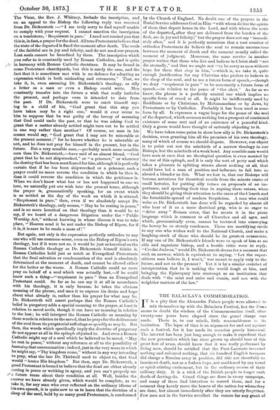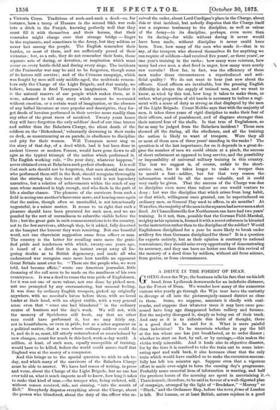THE BALACLAVA COMMEMORATION.
IT is a pity that the Alexandra Palace people were allowed to mix themselves up with the Balaclava Festival, but the Times seems to doubt the wisdom of the Commemoration itself, after twenty-one years have elapsed since the grand charge wan made. There is, to our minds, little reasonableness in its hesitation. The lapse of time is an argument for and not against such a festival, for it has made its occasion purely historical. The interval has been just long enough to make it expedient that the new generation which has since grown up should hear of this great feat of arms, should know that it was really performed by living men, should be satisfied that the Poet-Laureate invented nothing and coloured nothing, that six hundred English troopers did charge a Russian army in position, did ride out cheerfully to imminent death, not as a forlorn hope, not maddened by any novel or spirit-stirring excitement, but in the ordinary course of their military duty. It is a trick of the British people to forget such deeds of derring-do. Grand things are done in every eaanpaign, and many of them find historians to record them, and for a moment they keenly move the hearts of the nation for whom they are done, but almost immediately after they are utterly %rotten. Few men not in the Service recollect the reason for anr grant of
a Victoria Cross. Traditions of such-and-such a deed—as, for instance, how a troop of Hussars in the second Sikh war rode into a ditch in the Punjab, knowing perfectly well that they must fill it with themselves and their horses, that their comrades might charge over that strange bridge — linger in the regiments, and sometimes in the Army, but they seldom or never last among the people. The English remember their battles, or most of them, and are sufficiently proud of their victories ; but, as a rule, they do not remember their feats, those separate acts of daring, or devotion, or inspiration which must occur on every battle-field and during every siege. The incidents of the Peninsular war may be said to be forgotten, though some of its heroes still survive ; and of the Crimean campaign, which was fought by men still only middle-aged, the multitude remem- bers only the Charge of the Light Brigade, and that mainly, we believe, because it fired Tennyson's imagination. Whether it is the natural reserve of our people which makes them, as it were, ashamed to tell any story which cannot be recounted without emotion, or a certain want of imagination, or the absence of any ballad literature at once popular and descriptive, they for- get deeds of heroism performed in their service more readily than any other of the great races of mankind. Twenty years hence they will have forgotten the only soldiers' deed of our time braver and nobler than the Balaclava Charge, the silent death of the soldiers on the 'Birkenhead,' voluntarily drowning in their ranks on deck, as unmurmuring as on parade, in obedience to discipline and pity for their women. Will Tennyson never sing us the story of that day, of a deed which, had it but been done in ancient Greece or modern France, would have gone down to all ages as the typical triumph of the nation which performed it. The English working rule, "Do your duty, whatever happens," never obtained even at Balaclava such perfect obedience. It is well that such acts should not be forgotten, that men should see those who performed them still in the flesh, should recognise thoroughly that the stirring tale they have all been told is not legendary narrative, but a relation of achievements within the reach of any man whose manhood is high enough, and who finds in the path of life a similar chance. The pleasure of the survivors from such a field in seeing one another's faces once more, and hearing once again that the nation, though often so unmindful, is not intentionally ungrateful, is a minor matter. It seems to us right that such a pleasure should have been procured for such men, and we are puzzled by the sort of unreadiness to subscribe visible before the fate ; but the great gain in such commemorations is to the country, not to the few survivors, although they, be it added, fully deserved at the banquet the honour they were receiving. Not one boastful word, not one chauvinist suggestion came from officer or man. The country is the better for recalling once more the grati- fied pride and tenderness with which, twenty-one years ago, it heard of a deed that in an instant swept away all lin- gering doubts as to British degeneracy, and made all who understood war recognise once more how terrible an opponent Great Britain must ever be. "These are the people who, we were told, had become effete," wrote one American journalist, little dreaming of the call soon to be made on the manliness of his own countrymen. It was a deed to rouse the true pride of Englishmen, for it was not one of mere valour, not one done by picked men, not one prompted by any overmastering, but unusual feeling It was done by ordinary English troopers, picked up originally anywhere, with no marshal's baton before them, with no loved leader at their head, with no object visible, with a very general sense even that "some one had blundered" in the ordinary course of business and the day's work. We will not, with the memory of Speicheren still fresh, say that no other race could have performed it, but we may fairly say, not in boastfulness, or even in pride, but as a sober argument on a political matter, that a race whose ordinary soldiers could do it, and do it so, must, till utterly outnumbered or overwhelmed by new changes, count for much in this hard, work-a-day world. A million, at least, of such men, equally susceptible of training, would have to be killed, before the world could assure itself that England was at the mercy of a conqueror.
And this brings us to the special question we wish to ask to- day, and which many of the survivors of the Balaclava Charge must be able to answer. We have had reams of writing, in prose and verse, about the Charge of the Light Brigade, but no one has ever told us, what it much imports us all to know, how long it takes to make that kind of man,—the trooper who, being ordered, will, without reason received, ride, not craning, "into the mouth of Hell." Everybody disputes everything about the Charge, about the person who blundered, about the duty of the officer who re- ceived the order, about Lord Cardigan's place in the Charge, about this or that incident, but nobody disputes that the Charge itself was a supreme testimony to the discipline, as well as valour of the Army—to its discipline, perhaps, even more than to its daring—for while without daring it never would have been made, without discipline it never could have been. Now, how many of the men who made it—that is to say, of the troopers who showed themselves fit for anything we can require of soldiers—had received five years', or three years', or one year's training in the ranks ; how many were veterans, how many had ever seen a shot fired in anger, how many were nearly -\ raw recruits? How far, in fact, was the efficiency of these men under those circumstances a superinduced and arti- ficial quality? We do not want to hear just now about the officers. Good officers are invaluable, but the pressing English difficulty is always the supply of trained men, and we want to know, as tried by this test, how long it takes to make them, or rather, what proportion of old hands is necessary to imbue a regi- ment with a sense of duty as strong as that displayed by the men of the Light Brigade. Count Moltke says that with the majority of men, it takes three years of rigid discipline to make their fear of their officers, and of punishment, and of disgrace stronger than their natural fear of the shells. Is that true of Englishmen, so far as may be judged from the Balaclava incident? Those men showed all the daring, all the obedience, and all the training the nation is likely to want of troopers. Were they all or most of them men of three years' standing in the ranks ? The question is of the last importance, for on it depends in a great de- gree the number of men we could obtain at a pinch, the success of short enlistment as opposed to long service, and the possibility or impossibility of universal military training in this country. The test we suggest is, of course, unfair to the short- service men, for it takes longer to make a trooper than to mould a foot - soldier, but for that very reason the. information would be all the more valuable, and it could very easily be given. That the success of the Charge was due to discipline even more than valour no one would venture to deny ; but was the discipline that which arises from long habit, or that which, willingness once granted, can be superinduced on ordinary men, as General Hay used to affirm, in six months? At Waterloo, the majority of the men in the squares had never seen a shot fired. At Chancellorsville few Northerners can have had two years' training. Is it not, then, possible that the German Field-Marshal, weighty as his opinion is, formed it with a secret reference in hismind to the instruction rather than to the discipline of the soldier? Would Englishmen disciplined for a year be more likely to break under artillery fire than Germans disciplined for three? It is a question for experts entirely, but as their opinion is contrary to national aonvenience, they should seize every opportunity of demonstrating its accuracy, and they can have no better one than this revival of the memory of a deed done by soldiers, without aid from science, from genius, or from circumstances.



































 Previous page
Previous page